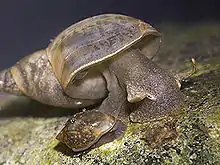基眼類
基眼類(學名:),舊稱基眼目,原是腹足纲肺螺亚纲(有肺類)之下三個目級分類之一(另外兩個是柄眼類和收眼類)。這些物種大多數生活在淡水中,包括有淡水螺及蛞蝓。
| 基眼目 化石时期: | |
|---|---|
 | |
| 兩隻基眼類的淡水螺,當中體型較大的是静水椎实螺(Lymnaea stagnalis) | |
| 科学分类 | |
| 界: | 动物界 Animalia |
| 门: | 軟體動物門 Mollusca |
| 纲: | 腹足纲 Gastropoda |
| 目: | 基眼目 Basommatophora Keferstein in Bronn, 1864 |
| 科 | |
|
見內文 | |
| 多样性[1] | |
| 約300個物種 | |
在2005年出版的《布歇特和洛克羅伊的腹足類分類》 whenever 单系群 has not been tested, or where a traditional 分類單元 of gastropods has now been discovered to be 並系群 or 多系群, the term "group" or "informal group" was used.
基眼類物種已知最早於石炭纪時就已存在,直至現在的全新世[2]。
本分類單元絕大多數的成員均為能呼吸空氣的淡水螺。當中數量最多的三個科,即椎實螺科(Lymnaeidae)、扁蜷科(Planorbidae)及膀胱螺科(Physidae),其物種廣泛分佈於世界各地的池塘、溪澗、溝渠及淺水湖內。
但另一方面,松螺科(Siphonariidae)物種卻反過來重新回到海洋裡,成為一種帽貝狀的海洋腹足綱軟體動物,棲息於多石的潮間帶,使牠們成為了一種在低潮時仍然能夠呼吸到空氣的海螺。只有單一物種的两栖螺科是一種古老的物種,仍然保留有螺厣。 It lives at such a high tidal level that it could perhaps be considered semi-terrestrial. Members of the family Chilinidae are confined to temperate parts of South America, and the Latiidae are limpet-like and confined to New Zealand.
基眼類得名於其物種的眼睛位於觸角的基底。 Basommatophorans are characterized by having their eyes located at the base of their non-retractile tentacles, rather than at the tips, as in the true land snails 柄眼目. The majority of basommatophorans have shells that are thin, translucent, and relatively colorless, and all except Amphibola lack an 螺厣.
分類學
1997年分類
在較舊的1997年《旁得和林德伯格的腹足類分類》,基眼類是個亞目級的分類單元,包括下列七個總科:
- 斜顶螺总科 Acroloxoidea Thiele, 1931
- 两栖螺总科 Amphiboloidea J.E. Gray, 1840
- Superfamily Chilinoidea H. & A. Adams, 1855
- Superfamily Glacidorboidea Ponder, 1986
- 椎實螺總科 Lymnaeoidea Rafinesque, 1815
- 扁蜷總科 Planorboidea Rafinesque, 1815
- 松螺總科 Siphonarioidea J.E. Gray, 1840
斜顶螺总科
斜顶螺总科就只有斜顶螺科(Acroloxidae Thiele, 1931)一個科。
两栖螺总科
两栖螺总科包括有:
松螺總科
- [[]] Siphonariidae
- 松螺科(|Siphonariidae}} J. E. Gray, 1840
- 拟松螺科 Trimusculidae Zilch, 1959:只有拟松螺属一個屬,2016年被降格成為耳螺科之下的亞科。
2005年分類
The informal group Basommatophora contains the following superfamilies and the 演化支 Hygrophila (according to the Taxonomy of the Gastropoda (Bouchet & Rocroi, 2005)):
- Superfamily Amphiboloidea Gray, 1840
- Family 两栖螺科 Gray, 1840
- Superfamily Siphonarioidea Gray, 1827
- Family Siphonariidae Gray, 1827
- † Family Acroreiidae Cossmann, 1893
- Clade Hygrophila
- Superfamily Chilinoidea Dall, 1870
- Family Chilinidae Dall, 1870
- Family Latiidae Hutton, 1882
- Superfamily Acroloxoidea Thiele, 1931
- Family Acroloxidae Thiele, 1931
- Superfamily 椎实螺总科 Rafinesque, 1815
- Family 椎实螺科 Rafinesque, 1815
- Superfamily Planorboidea Rafinesque, 1815
The family 盘蜷亚科 has been reduced in the new taxonomy to the status of tribe Ancylini 康斯坦丁·萨米埃尔·拉菲内克-施马尔茨, 1815 of the subfamily Planorbinae 康斯坦丁·萨米埃尔·拉菲内克-施马尔茨, 1815 of the family 扁蜷科 康斯坦丁·萨米埃尔·拉菲内克-施马尔茨, 1815.
The family Carychiidae has been reduced in this taxonomy to the status of subfamily Carychiinae Jeffreys, 1830 of the family 耳螺科 L. Pfeiffer, 1854 (1822).
The family Lancidae has been reduced in this taxonomy to the status of subfamily Lancinae Hannibal, 1814 of the family 椎实螺科 康斯坦丁·萨米埃尔·拉菲内克-施马尔茨, 1815.[3]
2017年分類
松螺總科獨立了出來,成為了松螺目的唯一成員[5]。
參考文獻
- Correa C. A., Escobar J. S., Durand P., Renaud F., David P., Jarne P., Pointier J.-P. & Hurtrez-Boussès S. (2010). "Bridging gaps in the molecular phylogeny of the Lymnaeidae (Gastropoda: Pulmonata), vectors of Fascioliasis". BMC Evolutionary Biology 10: 381. doi:10.1186/1471-2148-10-381.
- Pek, I.; Vašíček, Z.; Roček, Z.; Hajn, V. & Mikuláš, R. . Olomouc. 1996: 264 pp. ISBN 80-7067-599-3 (捷克语).
- Bouchet, P.; Rocroi, J.-P.; Frýda, J.; Hausdorf, B.; Ponder, W.; Valdés, Á. & Warén, A. . Malacologia (Hackenheim, Germany: ConchBooks). 2005, 47 (1–2): 1–397. ISBN 3-925919-72-4. OCLC 61351079. OL 42989175M. S2CID 83847814.
- Jörger, K.M.; Stöger, I.; Kano, Y.; Fukuda, H.; Knebelsberger, T. & Schrödl, M. . BMC Evolutionary Biology. 2010, 10 (323). CiteSeerX 10.1.1.291.8310
 . OCLC 682930730. PMC 3087543
. OCLC 682930730. PMC 3087543  . PMID 20973994. S2CID 6355980
. PMID 20973994. S2CID 6355980  . doi:10.1186/1471-2148-10-323
. doi:10.1186/1471-2148-10-323  .
. - Bouchet, P.; Rocroi, J.-P.; Hausdorf, B.; Kaim, A.; Kano, Y.; Nützel, A.; Parkhaev, P.; Schrödl, M.; Strong, E.E. . Malacologia. 2017, 61 (1–2): 1–526. OCLC 7296100651. S2CID 91051256. doi:10.4002/040.061.0201.